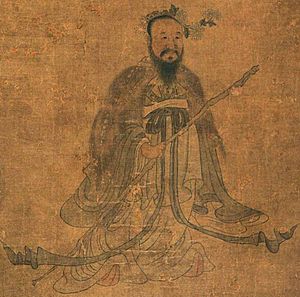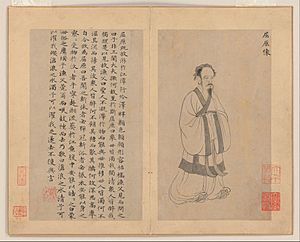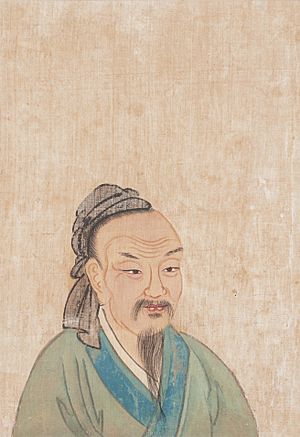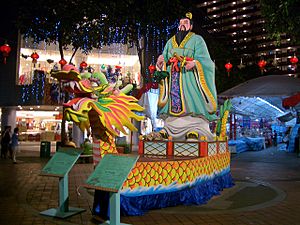Qu Yuan facts for kids
Quick facts for kids
Qu Yuan
|
|||||||||||||||||||||||||||||
|---|---|---|---|---|---|---|---|---|---|---|---|---|---|---|---|---|---|---|---|---|---|---|---|---|---|---|---|---|---|

Portrait of Qu Yuan by Chen Hongshou (17th century)
|
|||||||||||||||||||||||||||||
| Born | c. 339 BC State of Chu, in modern-day Zigui County, Hubei, China |
||||||||||||||||||||||||||||
| Died | 278 BC (aged 62) Miluo River |
||||||||||||||||||||||||||||
| Occupation | Poet, politician | ||||||||||||||||||||||||||||
| Chinese name | |||||||||||||||||||||||||||||
| Chinese | 屈原 | ||||||||||||||||||||||||||||
|
|||||||||||||||||||||||||||||
Qu Yuan (c. 340 BC – 278 BC) was an important Chinese poet and government official. He lived during the Warring States period in the ancient State of Chu.
Qu Yuan is famous for his deep love for his country. He also made big contributions to classical Chinese poetry. Many poems in the Chu Ci collection are thought to be written or inspired by him. The Chu Ci (also called The Songs of the South) is one of the two most important collections of old Chinese poems.
People also remember Qu Yuan because of the story behind the Dragon Boat Festival. However, we don't have many historical facts about his life. Some experts even question if he wrote all the poems linked to him.
Contents
Life Story of Qu Yuan
The main source of information about Qu Yuan comes from a book called Records of the Grand Historian (Shiji). This book was written by Sima Qian a long time after Qu Yuan lived. Sima Qian wrote that Qu Yuan was part of the royal family of Chu. He worked as an official for King Huai of Chu, who ruled from 328 to 299 BC.
Early Career and Exile
When King Huai first became king, Qu Yuan was a high-ranking official. But other officials who didn't like him spread lies about him. Because of these lies, King Huai sent Qu Yuan away from the capital. This is called being exiled.
Later, Qu Yuan was allowed to return. He was sent on a special trip to the State of Qi. He tried to fix the relationship between Chu and Qi, which King Huai had broken.
Later Exile and Poetry
During the rule of King Qingxiang of Chu, Qu Yuan was again slandered by another official. This led to his second exile, this time to areas south of the Yangtze River.
While in exile, Qu Yuan traveled a lot. He collected old stories and folk songs. He also wrote some of the most famous poems in Chinese literature. These poems showed his deep worry and sadness for his home state. Legend says he became very sad and thin. He would often look at his reflection in a well, which became known as the "Face Reflection Well." There is still a well in Zigui County, Hubei Province, that people believe is the original well.
In 278 BC, Qu Yuan heard that the Qin state had captured his country's capital, Ying. He then wrote a long poem called "Lament for Ying." He is said to have died shortly after this sad event.
Qu Yuan's Lasting Impact
Qu Yuan is believed to be the first Chinese poet whose name was directly linked to his works. Before him, most poems didn't have a known author. He also created a new style of poetry called sao style. This style allowed for longer, more flowing lines, unlike the older four-character verses. This made poems more rhythmic and expressive.
Qu Yuan is also seen as a key figure in Romanticism in Chinese literature. His amazing poems influenced many great poets who came after him. During the Han Dynasty, Qu Yuan became a symbol of a loyal official who was not treated fairly.
During World War II, Qu Yuan was seen as "China's first patriotic poet." This helped inspire people during the war.
Dragon Boat Festival Origins
Every year, on the day Qu Yuan is said to have died, people hold special boat races. These are known as dragon boat races. Countries around China, like Vietnam and Korea, also celebrate this Dragon Boat Festival. It is a part of their shared culture.
Space Exploration Connection
China's space program for exploring other planets is called Tianwen. This name comes from a poem by Qu Yuan. The first mission to Mars, Tianwen-1, was launched in 2020. It reached Mars in 2021, and its lander and rover successfully landed on the surface.
See also
 In Spanish: Qu Yuan para niños
In Spanish: Qu Yuan para niños
- Jiu Ge
- Classical Chinese poetry
- Tianwen
- Song Yu
- Dragon Boat Festival
- Tianwen-1
- Qu (surname 屈)
- Shun Li and the Poet




